Mozambique: Cabo Delgado "under control" with FDS pursuing terrorists
Nerves remain on edge in Mozambique province that still smells of burning
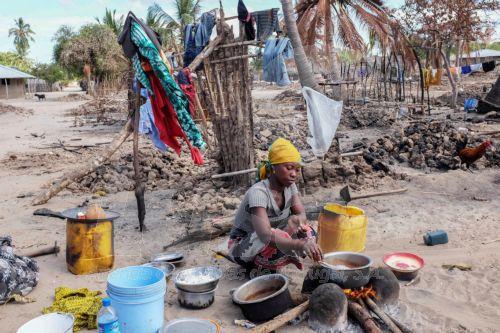
Photo: Antonio Silva / Lusa
Nerves are still on edge in the province of Cabo Delgado after the latest attacks on remote attacks caused the deaths of 35 to 40 inhabitants since the last Sunday in May.
The owners of a supermarket in Pemba, the provincial capital, are suspected of having on 13 June simulated a robbery as cover for embezzlement, in a staged burst of violence that involved shots fired at empty boxes where the robbers were supposed to be – but where there was actually no one.
Police called to the scene announced that it had been a false alarm, but more than a week on some websites were still referring to the attack as having resulted in the deaths of two people among several hostages.
On the day in question, the scare prompted other institutions in the city to close down temporarily, in turn fostering rumours that an armed group that is said to have been terrorising isolated villages further north had reached Pemba.
“There were people that told me they had heard bursts of machine-gun fire” that could not have been fired, a Portuguese businesswoman in Cabo Delgado who that morning picked up the telephone to seek information about the situation told Lusa.
The spraed of misinformation, she said, reflects a general nervousness. One of the latest attacks that are suspected to have been carried out by groups hidden in the bush was in the village of Natugo, in Macomia district, where a man was found dead, with machete marks on his body.
A few days earlier, the same district saw one of the most destructive acts of the current wave of violence: an attack that left seven people dead and devastated a village, Naunde, whose 164 traditional houses (built from clay blocks, posts and grass) were burned, leaving 760 people homless.
“Thief, thief!” were the first shouts that broke out that night, around 11pm on 4 June, recalls Mariana Abedi, 62, Naunde’s chief.
Two men answered the call, but then found themselves attacked with machetes and a new shout was heard from someone who was watching it all: “War. The war has arrived”.
Other residents woke up and came out of their houses with “azagaias [lances] and machetes”, ready to defend themselves, recalls Maurício Miranda, the village’s first secretary, but the attackers “fired guns” and the would-be defenders of Naunde “lost control”.
Homes were sacked and then set alight in scenes of confusion in which “you couldn’t see anything, there was no moon yet”, according to Abedi, who retains the image of chaos with “children running, without their parents”.
Seven people were killed: three decapitated, one whose throat was cut and another three hacked with machetes until their fell to the ground. The five cars that served as links with Mucojo, the nearest town, and Macomia, the district capital, were burned.
The centre of Naunde is now all but razed to the ground, with stones and grey clay in shards mixed with ash from thatch and wooden posts, the ground still smelling of burning.
Residents cook and work amidst the debris, sleep out in the open, look at the destruction that surrounds them with the same helplessnes as on the night when they had to wait for the flames to burn themselves out, because they had no way of putting them out and a strong wind was blowing, recounts Abedi.
Asked about who was responsible for the destruction, the village chief says that they “are sons who know Naunde”.
“They are people like us”, because no one enters a place as they did “without knowing the house”, she says, adding: “We never suspected that they lived here, there was never anything” to prompt any suspicion.
Donations in the form of capulanas (a type of local sarong), food and construction materials have been arriving, as residents return after fleeing for their lives.
Fear is spreading, though, because two days after the attack in Naunde, on 6 June, the village of Namaluco a few kilometres to the south was burned, with 200 homes destroyed. Even if everything is rebuilt a feeling of insecurity has been sown that has already reached the district capital, Macomia, more than 50 kilometres away on bumpy dirt roads.
On the way, Lusa came across soldiers stationed in three places, with firearms and vehicles, who were unwilling to provide any information. Several other attempts to elicit information from the authorities also failed.
Shebane Shea, a young man who fills plastic bottles with food oil to sell in the market, in the centre of the town of Macomia, has had many sleepless nights.
“I even slept in the bush, on one night when rumours went around the market here that there was going to be an attack” on the town, he told Lusa, explaining that it is preferable to sleep in the open rather than be caught at home when someone sets your house on fire.
Jacinta Medi is also sleeping away from home and no longer even undresses, instead sleeping in the clothes she is wearing here in the market – a tunic and headscarf – and her husband does the same. “There’s no time for love-making with these attacks,” she says.
Suleimane Namanca, a farmer, would like weapons to combat “that Al-Shabaab, but the government isn’t giving us any,” he laments, adding that he would only sleep soundly once more if he had a gun under his pillow.
Anastácia Jerónimo, a native of Nampula, the provincial capital some 500 kilometres to the south, is a market trader in Macomia along with her husband, a Tanzanian.
“My mother is always crying” because she doesn’t want to see her daughter going to those lands in the north, she recounts.
Sinan Jamal is now opening his fried goods stall later in the day. He once used to set up around 5am, but now only opens after 7am.
He knows that the police are patrolling the streets at night to protect locals, but confesses that he is now a light sleeper: “My ears are always outside, listening.”


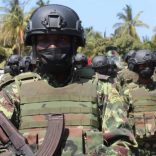
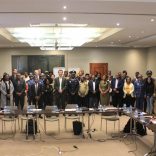

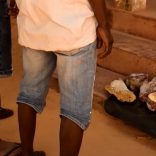

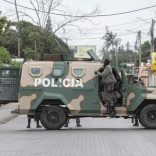




Leave a Reply
Be the First to Comment!
You must be logged in to post a comment.
You must be logged in to post a comment.